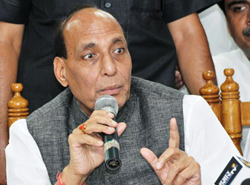Manesar (Haryana), Oct 16: With China reacting sharply to government's plans to construct a border road in Arunachal Pradesh, Home Minister Rajnath Singh today sent a strong message, asserting that no one can warn India.
"Today, no one can give warning to India. We are a very powerful country," he told reporters on the sidelines of a function here.
Singh was asked about China's strong reaction to plans to construct a road network along McMahon line from Mago-Thingbu in Tawang to Vijaynagar in Changlang district of Arunachal Pradesh to match China's infrastructure development.
"There is a dispute about the eastern part of the China- India border. Before final settlement is reached we hope that India will not take any action that may further complicate the situation," Chinese Foreign Ministry Spokesman Hong Lie had said in Beijing.
The Home Minister today said India and China should sit together to resolve the border dispute.
Government is taking a number of steps for improving infrastructure along the Sino-Indian border, especially in Arunachal Pradesh and Jammu and Kashmir.
Forces of the two countries were locked in a stare-down at Chumur in Ladakh for a fortnight beginning September 11, which clouded the Chinese President Xi Jinping's three-day India visit.
For days, soldiers of the Chinese PLA and Indian Army personnel were engaged in an eyeball-to-eyeball confrontation in the area.
Prime Minister Narendra Modi raised the matter twice with the Chinese president. Tension erupted when some Chinese workers crossed over with equipment to build a road up five kilometre deep inside the Indian territory. A marathon flag meeting between the two armies facilitated an end to the crisis.
The Home Minister on Tuesday reviewed the prevailing situation along the 3,488 km-long border with China and steps being taken to stop incursions in future.





Comments
Add new comment